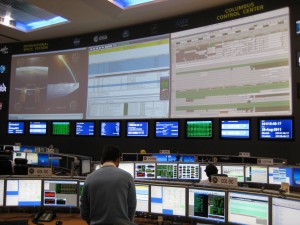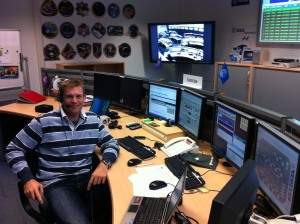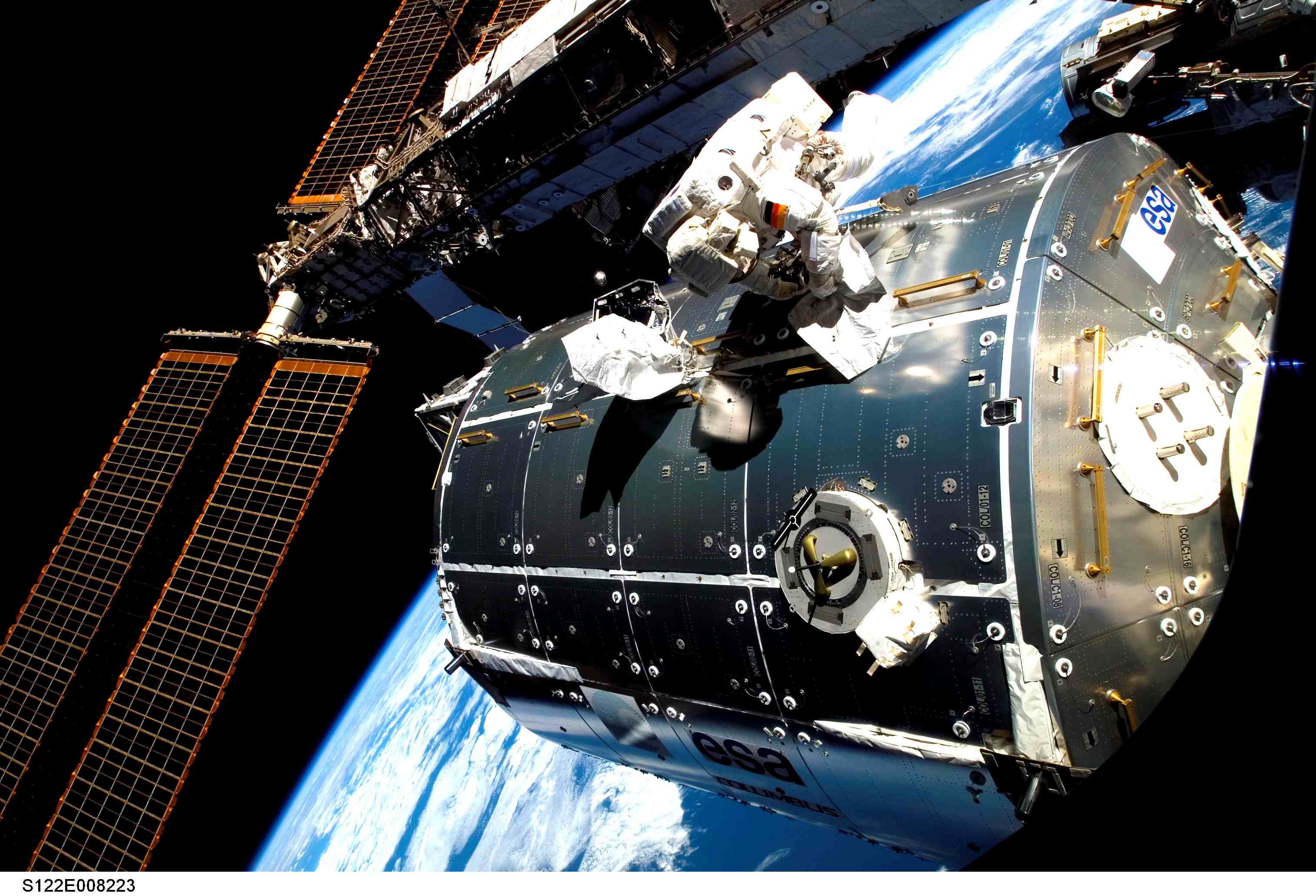“Good morning, Munich”, so begins each new day at the Columbus Control Center in Oberpfaffenhofen, just outside of Munich, when the crew onboard ISS calls down for the morning daily planning conference (DPC). The call, which normally is received at 08:00 UTC (9:00 am local time in Germany) is literally an-out-of-this-world teleconference between the astronauts onboard ISS and the flight control teams in Houston, Huntsville, Moscow, Munich, and Tsukuba, Japan. The astronauts and the flight control teams around the world discuss any last minute changes to the activities scheduled for the day and clear up any questions that remain.
The voice communication between the astronauts and the flight control team is the responsibility of a single person, known as the capsule communicator or Capcom at Mission Control Center-Houston at NASA’s Johnson Space Center (JSC). It is a position that dates back to the beginning of manned space flight in the 1960’s, when the astronauts flew onboard the Mercury, Gemini, and Apollo capsules. Traditionally, astronauts have performed this role, the idea being that astronauts can translate instructions from the engineering-speak of flight controllers to a more operationally useful language, and more importantly, understand the operational needs of their fellow astronauts in space.
With the launch and docking of the European laboratory module “Columbus” to the ISS in 2008, it became necessary for a European flight control team to oversee daily operations in Columbus. Thus was born the Columbus Control Center (COL-CC) and with it, the position of European Capcom or Eurocom.
It is also why I am here this week at COL-CC to participate in a Joint Multi-Segment Training (JMST) simulation, which is engineering-speak for a training simulation of the daily activities onboard ISS, involving all the international partners. For, although much of our time is spent in training, as you no doubt will know from reading this blog, we also have many other duties and responsibilities as astronauts, especially for those of us not yet assigned to a mission. For Thomas, Tim, and myself that means spending part of our time working as Eurocom at COL-CC.
“Eurocom, Capcom, on the Xcom loop for morning DPC coordination”, calls David Saint-Jacques (@Astro_DavidS), my Canadian Space Agency astronaut colleague, who, in the role of Capcom, is currently sitting at JSC in Houston and participating in the same JMST.
“Good morning, David”, I reply.
“Good morning, Andreas. When the crew calls down for today’s morning DPC, I will be handing over to you and when you are finished, you will be handing over to Glavny in Moscow”, informs David. Glavny, or Главный in Cyrillic, is the Russian counterpart to Capcom at Mission Control Center-Moscow.
I am a little nervous today, as this is my first JMST and the first time I am speaking with Capcom in Houston over-the-loops. In addition to the four European training simulations that I have already completed, I need to participate in three JMST’s before I will be certified to work in real-time ops. Thomas and Tim were both certified earlier this year and have already worked a few real shifts on-console.
During today’s simulation, the crew-surrogates who play the role of astronauts onboard ISS include not only training instructors from EAC and JSC, but also our astronaut colleague Hans Schlegel, who flew aboard Space Shuttle Atlantis on STS-122 in February 2008, which delivered and installed Columbus on the ISS. Today, the crew-surrogates will perform the “Energy” and “Meteron” experiments in Columbus and throw as many questions as possible at me and the other members of the flight control team, in an attempt to anticipate all of the real questions that the crew onboard ISS might ask, when they, in a few weeks from now, actually perform the experiments under microgravity conditions.
Hans and I are in the middle of the morning DPC, discussing the “Energy” experiment, when the yellow light of a caution suddenly flashes up on the telemetry board. A power outlet in Columbus has tripped, possibly due to an over-current.
“COL-Flight, COL-SYS, on your loop. I see a caution in Columbus. PDU outlet trip, possibly due to an over-current. We need crew to perform a sniff test in Columbus for burning odour”, reports the Columbus Systems controller on the flight director’s voice loop.
“Eurocom copies”, I report on the flight director’s loop, while Hans continues speaking on the space-to-ground loop, unaware of the simultaneous conversation going on in the control center.
“Break, break, Hans”, I interrupt him mid-sentence. “We have a caution in Columbus. PDU outlet trip. We need you to go to Columbus and smell for burning odour in the deck area of the starboard end cone.”
“Good words”, confirms COL-SYS on the flight director’s loop, indicating that I have correctly relayed the information to the crew.
The morning DPC is interrupted, while Hans pretends to go to Columbus to determine if there is an actual fire. Hans is following carefully the script that the simulation directors have meticulously prepared weeks in advance and which will test the reactions of the flight control team to unexpected situations. A minute later, he is back on the loops.
“Munich, Station, on space-to-ground 1 for possible fire in Columbus”, calls Hans. “I detect no burning odour in Columbus or any other sign of fire.”
“Probable malfunction. No further crew action at this time”, reports COL-SYS, who has been listening in on the space-to-ground loop.
“Hans, I copy no sign of fire in Columbus”, I repeat. “Thanks for checking for us. We have no further actions for you at this time. We will troubleshoot the caution from ground.”
COL-SYS and the rest of the flight controllers at COL-CC kick into gear, trying to determine what equipment tripped the caution alarm. The morning DPC is not even finished yet and we have already had our first malfunction of the day. It is going to be a long simulation!
But testing ourselves against all possible malfunctions and emergencies, is what will hone our skills as flight controllers and, in a few months hopefully, will allow me to sit on console in real-time and assist André Kuipers (@Astro_Andre) and his crewmates with their daily activities onboard ISS.














Discussion: 6 comments
Interesting article, I did not know anything about this part of your job! Poor guys at JSC, 8am UTC is the middle of the night for them!
By the way, about a possible fire onboard the ISS, did it happen in the past? How long is a morning DPC? And onboard the ISS, who is in charge of doing this: the commander, or the astronaut who will have to run the experiment?
Спосибо большое!!!
Thanks Gabrielle.
We are indeed lucky in Europe to be on the same time schedule as the astronauts on ISS. It makes the morning DPC much more pleasant. If all five flight control centers (Houston, Hunstville, Moscow, Munich and Tsukuba) have a lot of information to communicate, the morning DPC may last 30 minutes, but it is usually much shorter than that. Typically, all astronauts onboard ISS participate in the morning DPC, but it is usually the commander who initiates the call.
Luckily, we have not had a fire on ISS so far. The only fire in space that I know of occurred onboard the Russian space station Mir in 1997.
Здравствуйте,
It’s me again; thank you for your answer and again for the article. Those last days I though a lot about what you wrote, and I was wonderting if the morning DPC was public. As for example the teleconferences with JPL for the Mars rover planning sessions, anyone who is around can basically stop by and listen to this. So between an every day planning conference for humans and an every sol planning session for the rover, is there any chance it would be the same rule?
Hello!
I’d be very glad too, if we could listen to the morning DPC as well. I imagine it’d be very interesting!
Greetings from Bavaria
Thanks for sharing your experience! Wow – it seems like there are so many aspects to training – and I was not aware how much global co-ordination is required in securing good communications! Is English always the medium of communication?
In fact, someone posed an interesting question to me regarding why you (as astronauts involved in intensive global collaborations) haven’t created your own language (since you all need to learn English and Russian in addition to your home language), and in some ways, from reading what you said, I think you already have. There is a lot of jargon that I think you must learn along the way.
Very interesting! If I had read before I could follow the Mission Volare much better.
Thanks for the post and good luck for your work! 🙂